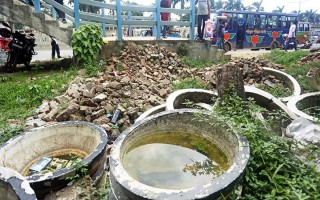Dengue still a risk
Though hospitalisation of dengue patients slowed down in recent days, over 300 patients were hospitalised per day across the country in the last 13 days of October.
Experts said dengue menace still remained a risk, but the activities to control mosquito by the Dhaka city corporations slowed down.
As the irregular rains continued across the country, the risk of breeding of aedes mosquito, the vector of dengue, remained high, they said.
Dhaka Medical College Hospital associate professor of medicine Robed Amin told New Age that the hospitalisation of dengue patients slowed down in recent days, but still ‘we are not in a stage of feeling much relieved.’
‘We expect the number would not increase suddenly this year, but hospitalisation of around 300 patients’ is not a small number,’ he said.
Till Sunday morning since October 1, at least 3,913 patients were hospitalised across the country, according to the Health Services.
Dengue cases reduced since September but at least 562 people were hospitalised per day with dengue in the past month, 16,856 patients in total in September.
Dengue cases were highest in August with at least 52,636 patients hospitalised in the month.
In July, the number of dengue patients’ hospitalisation was 16,253 while 1884 in June and 193 in May.
Since January, the total number of hospitalised dengue patients reached to 91,868.
Dengue, which was initially limited to the capital, as had been the case since its first reported occurrence in Bangladesh in 2000, started spreading outside the capital for the first time in the fourth week of July.
The dengue infection spread to the whole country in just one week and the severity in the outlying districts overtook that of the capital.
Since early September, dengue hospitalisation slowed down.
Health Services on Sunday said at least 287 new dengue patients were hospitalised across the country in the 24 hours ending 8:00am Sunday.
Among them, 100 were hospitalized in the capital and 187 in the districts.
At least 1,132 dengue patients were still in hospitals on Sunday, including 417 in the capital and 715 in the districts.
Entomologist Khalilur Rahman of Health Services told New Age that a recent countrywide survey on dengue, on which the final report is yet to be prepared, found high number of aedes mosquitoes all over the country.
In the survey, Aedes aegypti were found in high numbers in every city while Aedes albopictus were found in the rural areas, he said.
Robed Amin said that dengue has spread all over the country and it will be difficult to stop sporadic infections every day.
The mosquito control measures, whoever, slowed down in recent days, increasing the risk of citizens’ infecting with dengue.
Residents of different areas in the capital said they were still in panic of getting infected with dengue, but they witnessed minimal activities of mosquito control.
Hasan Ali, a resident of Khilgaon, said he did not saw any city corporation worker to spray adulticide or larvicide in his Goran neighbourhood in recent weeks.
Dhaka North City Corporation chief health officer Brig Gen Mominur Rahman admitted that they now had no intensified effort to control mosquito as they did during the peak dengue season.
‘But regular activities are going on to control mosquito,’ he said.
‘It’s not possible to give intensified effort round the year but the citizens have to be aware,’ he said.
Aedes mosquitoes live mostly in and around urban habitats and breed in clean water filled containers like abandoned cans, pots, cups, flower tubs, coconut shells and tyres at and around homes.
But Aedes albopictus lives in rural settings and breeds in natural water holes mostly in trees.
Unlike other mosquitoes, aedes mosquitoes bite during the daytime. Its peak biting period is two hours after sunrise and two hours before sunset.
News Courtesy: www.newagebd.net











